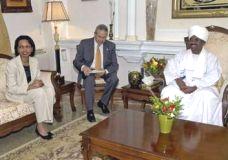Rice says Sudan has credibility problem on Darfur
ABO SHOUK, Sudan, July 21 (Reuters) – U.S. Secretary of State Condoleezza Rice on Thursday told Sudan’s president his government had a “credibility problem” on the issue of Darfur and she wanted to see “actions not words”.

|
|
U.S. Secretary of State Condoleezza Rice (L) meets Sudan’s President Omar Hassan al-Bashir (R) in Khartoum July 21, 2005. (Reuters). |
In a meeting marred by scuffles involving Rice’s aides and Sudanese security officials, Rice told President Omar Hassan al-Bashir to stop violence, especially against women, in the remote western region of his country.
“I said to the Sudanese government that they had a credibility problem with the international community ? I have said; `actions not words'”, Rice said in a round of interviews with journalists at a Darfur refugee camp.
A senior U.S. official travelling with Rice said the secretary of state told Sudanese officials the situation in Darfur was getting in the way of improved relations.
“On Darfur, her message was this is the obstacle to normalisation,” the official, who did not want to be named, told journalists travelling with Rice.
The official said Bashir’s priority was for the United States to lift sanctions on Sudan, which Washington says is a state sponsor of terror. Sudan hosted al Qaeda leader Osama bin Laden in the 1990s.
On Wednesday, Rice held out the possibility of sending an ambassador to Sudan for the first time since 1997, in a sign of improving ties after the installation of a new government on July 9 which included former rebels from the country’s south.
A peace deal earlier this year ended the southern civil war, which had lasted more than two decades and killed 2 million people.
“UNBELIEVABLE BUT TRUE”
Before arriving in Khartoum early on Thursday morning, Rice said she would seek to strike a balance between helping consolidate the coalition peace government and holding Sudanese accountable for the violence in Darfur.
Rice said she was particularly concerned women were still being raped in the conflict.
“Welcome, welcome Condoleezza,” sang scores of children who greeted Rice when she visited the northern Darfur Abo Shouk camp, home to some 50,000 people.
After talking to women who were victims of abuse, Rice said: “The stories are unbelievable but true … we have got to have a better response (from the Sudanese government)”.
Rebels in Darfur took up arms against the government in early 2003, accusing Khartoum of marginalising the arid province and discriminating against non-Arab settled communities in favour of Arab nomads.
The violence, which abated this year, has driven some 2 million people from their homes and killed tens of thousands.
Andrew Natsios, a top U.S. aid official with Rice, said the dip was largely because most villages had already been razed.
He said he suspected the government was still giving material support to the militia. But he said the government no longer sent gunships to assist militia attacks.
At the camp, Rice said the United States could loosen some of its sanctions after Sudanese officials told her the measures hindered efforts to move people and aid around the country.
“Obviously, if there is a case on the humanitarian side we would be willing to look at it,” she said.
RICE MEETS GARANG
Under the southern peace deal, former southern rebel leader John Garang was made vice president in the new government. Rice told Bashir Washington supported the new government.
Garang assured Rice that as a former rebel he understood the importance of bringing the Darfur rebels into the political process, said a U.S. official, who did not want to be named.
A 3,000-strong African Union force is monitoring an oft-violated ceasefire in Darfur.
Foreign Minister Mustafa Osman Ismail was willing to allow as many African Union peacekeeping troops as was necessary into Darfur, officials said.
The Sudanese government apologised to Rice over the manhandling of U.S. officials and journalists outside her talks with Bashir, a U.S. spokesman said. Rice had demanded an apology for the incident.
